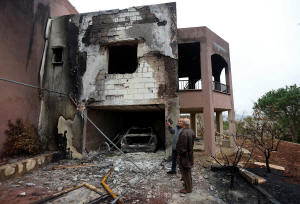People in southern Lebanon, rushing home amid truce, hope fighting is
over
 Send a link to a friend
Send a link to a friend
 [November 29, 2023]
By Aziz Taher and Hussein Al Waille [November 29, 2023]
By Aziz Taher and Hussein Al Waille
MAYS AL-JABAL, Lebanon (Reuters) - People in southern Lebanon who fled
last month have rushed home to inspect damage during the temporary truce
in the war between Israel and Palestinian group Hamas that they hope
will end the worst border clashes in nearly 20 years.
Negotiators are urging Israel and Hamas to extend the six-day ceasefire
in a conflict which has sent shockwaves around the region since Oct. 7,
spilling across the Lebanese-Israeli border where Israel and Iran-backed
Hezbollah have been trading fire.
Some 200 km (124 miles) from the Gaza Strip in southern Lebanon, people
in areas scarred by Israeli shelling were grateful that they had been
able to return home since Friday, when the ceasefire between Israel and
Hamas came into effect.
"We are very happy to have returned to the village," Mbadda Salloum, a
resident from the village of Yaroun, said outside a church damaged in
the recent hostilities.
He had fled north with his family to the capital, Beirut.
"We wish for this truce to be permanent, God willing."
With Israel launching air and artillery strikes and Hezbollah firing
rockets at Israeli positions on the frontier, it has marked the worst
violence at the Lebanese border since Hezbollah, a Hamas ally, and
Israel fought a war in 2006.

Many families are using the pause in fighting to collect belongings from
their homes and survey damage. Schools and most shops are shut.
About 55,500 people across southern Lebanon had fled their homes as of
Nov. 21, according to the United Nations. Many also fled their homes in
northern Israel.
"They have missed their homes and their lands," said Kassem Jaber, mayor
of the village of Mhaibib. People had been waiting on the village
outskirts till just after 7 am last Friday when the truce took effect,
he said, then rushed back to their homes.
Huge chunks of walls were missing, windows were shattered, and piles of
broken dishes and furniture were strewn across the living room of
villager Amal Jaber.
"The buildings are not important, we care about the people (who have
died)", she said.
Israeli attacks have killed about 100 people in Lebanon - 80 of them
Hezbollah fighters - since Oct. 7.
PEOPLE 'WANT THEIR LAND'
Mayor Jaber said that although no one in his village had been killed in
Israeli strikes, homes had been destroyed and villagers were unable to
harvest their olives. They had also missed out on planting next season's
crops.
[to top of second column]
|

Resident Kamal Rizk chats with Abdel al-Moneim Choukair, head of the
municipality in the town of Mays al-Jabal, outside his house that
was damaged during Israeli shelling in recent weeks prior to a truce
taking hold between Hamas and Israel that has informally extended to
southern Lebanon, in Mays al-Jabal, near the border with Israel,
southern Lebanon November 28, 2023. REUTERS/Aziz Taher

He said people planned to stay. "People want dignity and they want
their land."
Yellow banners mourning Hezbollah fighters killed in the fighting
lined roads in Mhaibib and other villages.
Abdel al-Moneim Choukair, head of the municipality in the town of
Mays al-Jabal, a mile from the border, said many people had been
returning to their homes as the ceasefire stretched into its fifth
day.
Twenty kilometers to the west, in the village of Yater, a farmer in
her 50s named Fatima Kryim gave thanks for the calm.
"We want to cultivate our land and plant before the winter," said
Kryim.
"We will be here until we hear the first shell, if it falls ... We
will take advantage of the truce until the last moment."
A senior Hezbollah politician, Hassan Fadlallah, said on Tuesday his
group had started paying compensation to people who had suffered
losses from Israeli strikes.
Citing a Hezbollah survey of damage caused by Israeli attacks,
Fadlallah said 37 residential buildings had been totally destroyed
and 11 more completely burned. Another 1,500 homes across the south
had suffered varying degrees of damage.
In the village of Alma al-Chaab, local hotel owner Milad Eid said
about half of the farmland and groves of almonds, avocados and
olives were burned, as well as eight houses and the water tank.
"If there's a longer calm, we can actually repair all of this," he
said, adding that officials from Lebanon's government and
Hezbollah's construction arm, Jihad al-Bina, and some NGOs had
visited to assess the damage.

"We just need it to be over," he said of the war. "We want an
extension (of the truce) to get to a full calm. It seems possible."
(Reporting by Aziz Taher and Hussein Al Waille in Mays Al-Jabal;
Additional reporting by Laila Bassam and Maya Gebeily in Beirut;
Writing by Maggie Fick; Editing by Tom Perry and Gareth Jones)
[© 2023 Thomson Reuters. All rights
reserved.]This material
may not be published, broadcast, rewritten or redistributed.
Thompson Reuters is solely responsible for this content. |